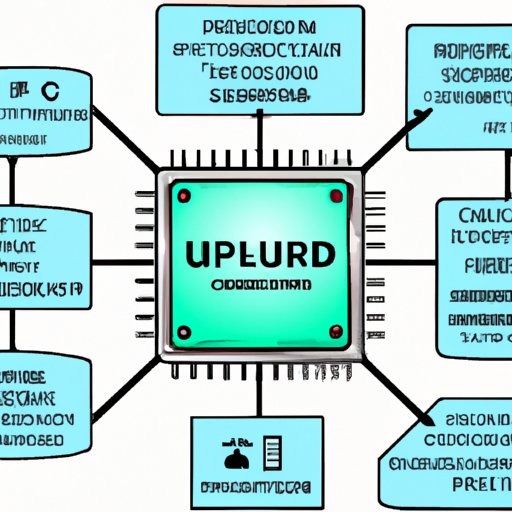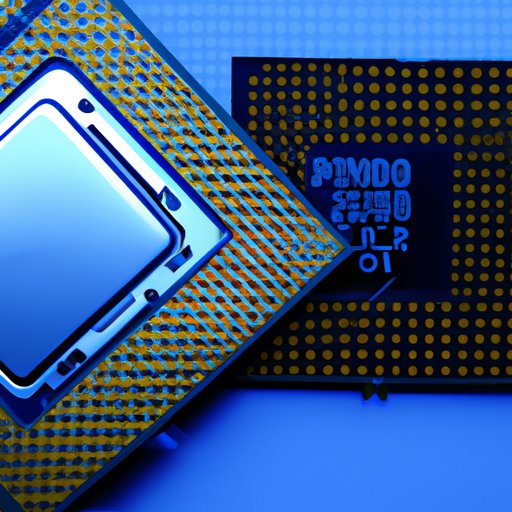Introduction
A central processing unit (CPU) is the main component of a computer that processes instructions and performs calculations. It is responsible for executing programs and managing all other hardware components. This article will explore how CPUs work, from their architecture and different types of CPUs to how to optimize your PC for maximum performance. We’ll also discuss advances in CPU technology and what the future holds.
Step-by-Step Guide to Understanding CPU Functionality
Understanding how a CPU works can be complicated, but it is necessary for anyone who wants to build or maintain a computer. Here is a step-by-step guide to understanding CPU functionality:
What is a CPU?
A CPU is the most important component of any computer. It works by executing instructions from a program or software application, which are stored in memory. The CPU then interprets the instructions and carries them out, either by directly performing the operation or by sending signals to other components of the computer. The speed of the CPU determines how quickly it can process instructions, so faster processors can execute more complex tasks in less time.
How does a CPU work?
The CPU consists of several parts, including the arithmetic logic unit (ALU), control unit (CU), and registers. The ALU is responsible for performing mathematical operations, such as addition, subtraction, multiplication, and division. The CU is responsible for controlling the flow of data between the ALU and other components of the computer. The registers are used to store data temporarily while the CPU is executing instructions.
What are the different components of a CPU?
The components of a CPU include the arithmetic logic unit (ALU), the control unit (CU), registers, cache memory, and buses. The ALU is responsible for performing mathematical operations, such as addition, subtraction, multiplication, and division. The CU is responsible for controlling the flow of data between the ALU and other components of the computer. The registers are used to store data temporarily while the CPU is executing instructions. Cache memory is a type of fast memory used to store frequently accessed data. Buses are used to connect the various components of the CPU.

An Overview of CPU Architecture and its Components
Now that we have a basic understanding of how a CPU works, let’s take a look at the different types of CPUs and how they compare in terms of performance. There are two major types of CPUs: single core and multi-core. Single core CPUs have one processor core that handles all instructions sent to it, while multi-core CPUs have multiple processor cores that can handle multiple instructions simultaneously. Multi-core CPUs are typically more powerful and energy efficient than single core CPUs.
When comparing CPUs, it is important to consider the type of application you will be using. For example, if you are running a graphics-intensive game or video editing software, you will need a powerful multi-core processor. On the other hand, if you are just browsing the web or writing documents, a single core processor should be sufficient.
How to Optimize your PC for Maximum CPU Performance
If you want to get the most out of your CPU, there are a few steps you can take to optimize your PC for maximum performance. First, make sure you have the latest drivers for your CPU installed. Outdated drivers can cause performance issues, so it is important to keep them up to date. Second, make sure you are running the latest version of your operating system. Updating your OS can help improve CPU performance. Finally, you can use a utility like Task Manager to monitor your CPU usage and identify any potential bottlenecks.
Another way to improve CPU performance is to invest in a multi-core processor. Multi-core processors can handle multiple tasks simultaneously, which can significantly improve performance. They also tend to be more energy efficient than single-core processors, so you can save money on your electricity bill.
Advances in CPU Technology: What’s Next?
CPU technology has come a long way in the past few decades, and it continues to evolve. One of the most exciting developments is the emergence of quantum computing. Quantum computers use quantum bits (qubits) instead of traditional bits to store data, allowing for much faster processing speeds. Other emerging technologies include artificial intelligence (AI) and machine learning (ML). These technologies are being used to develop more powerful and efficient CPUs.
As technology continues to advance, it is likely that CPUs will become even more powerful and energy efficient. In the future, CPUs may be able to process data faster, handle more tasks simultaneously, and consume less power. This could lead to more powerful computers and devices, as well as new applications and uses for CPUs.
Conclusion
In this article, we explored how CPUs work and how to optimize your PC for maximum performance. We discussed the different types of CPUs and the benefits of multi-core processors. We also looked at advances in CPU technology and what the future may hold. By understanding how CPUs work and what the future may bring, you can make informed decisions when it comes to choosing the right processor for your needs.
To sum up, a CPU is the most important component of any computer. It works by executing instructions from a program or software application, which are stored in memory. Different types of CPUs have different performance levels and energy efficiency. To maximize your CPU performance, make sure you have the latest drivers installed, upgrade your OS, and use a utility like Task Manager to monitor your CPU usage. Finally, emerging technologies such as quantum computing, AI, and ML are paving the way for more powerful and efficient CPUs in the future.
(Note: Is this article not meeting your expectations? Do you have knowledge or insights to share? Unlock new opportunities and expand your reach by joining our authors team. Click Registration to join us and share your expertise with our readers.)
